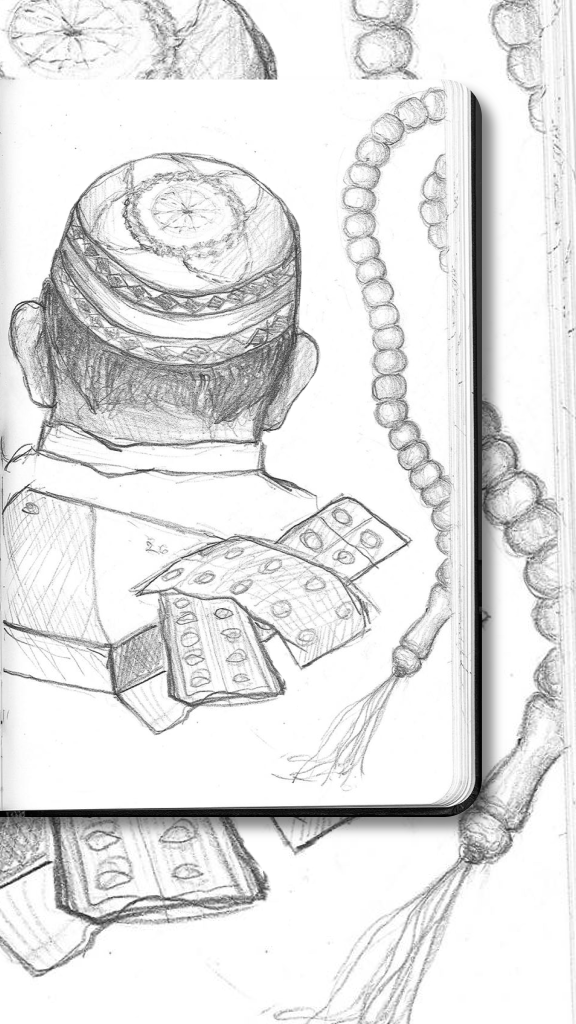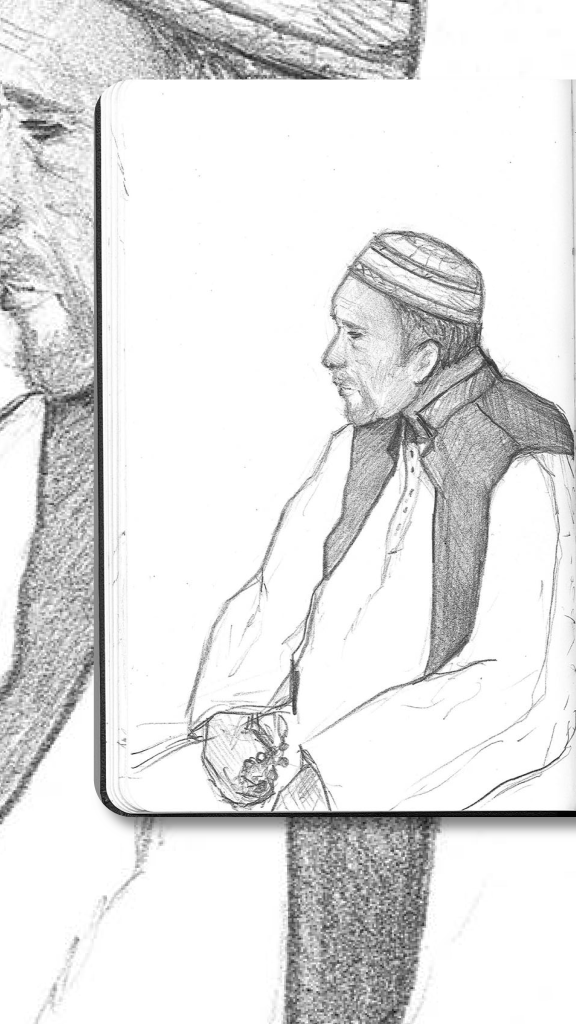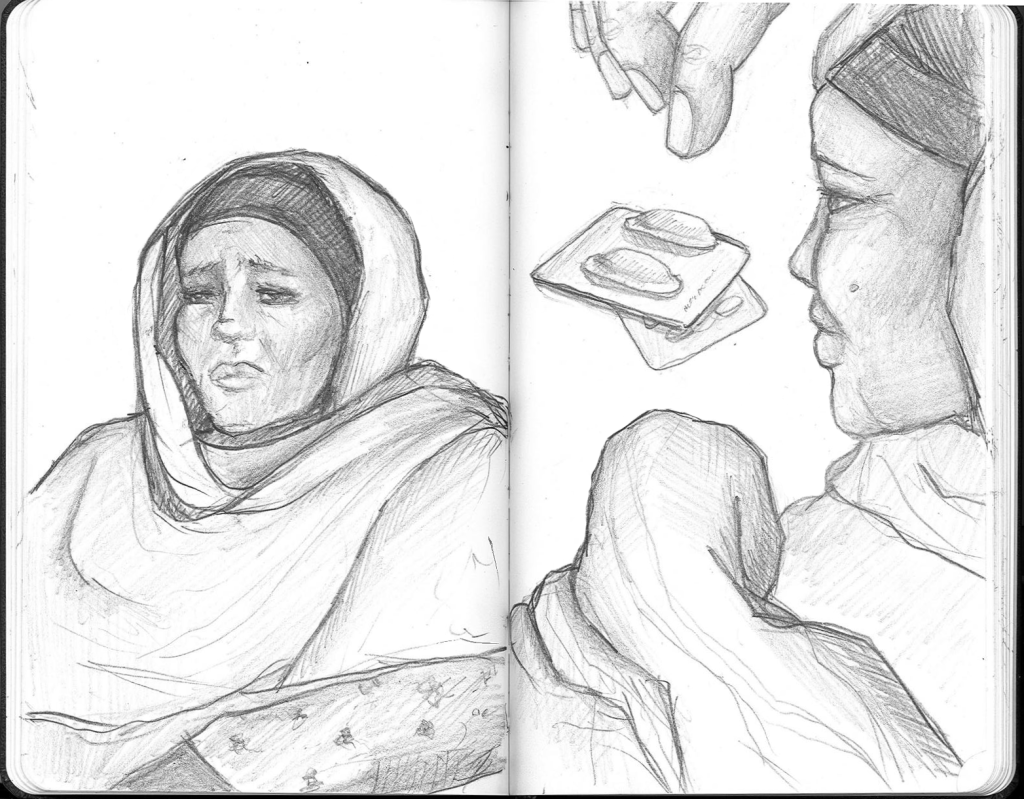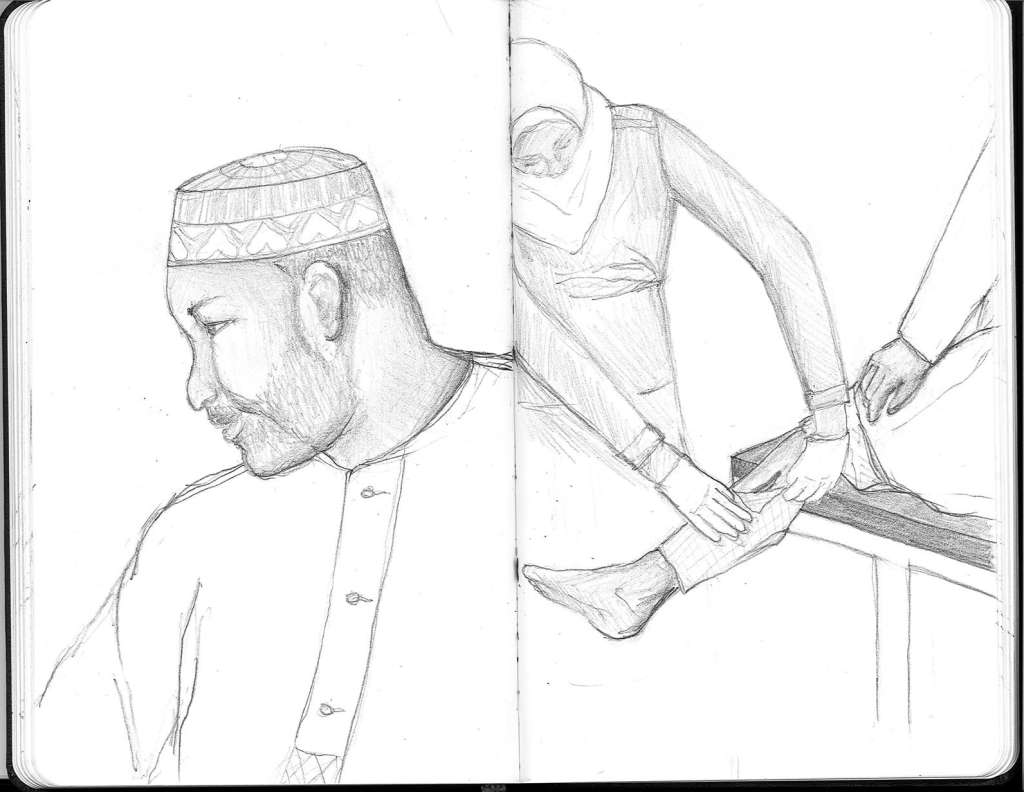Khaled* sits in the corner of the waiting room, with his UNHCR registration card in one hand, and a little plastic bag full of empty medication packets in the other. This is his third visit to the clinic in Daraw, receiving treatment for his chronic illness. Khaled is one of the 1.5 million Sudanese living in Egypt, many of them crossed
In Daraw, Médecins Sans Frontières (MSF) runs a mobile clinic in partnership with Om Habibeh Foundation (OHF), an Egyptian organization with a long history in Aswan governorate. The two organisations started implementing the mobile clinic activity in January 2025 in five different locations in the Egyptian southern governorate.
The objective of this activity is to make access to healthcare easier to people who need it, while supporting the existing healthcare system in Aswan governorate. Since then, the team has provided over 7,265 general consultations and over 6,600 consultations for non-communicable diseases. In addition, the team has provided more than 1,470 individual mental health consultations and more than 2,440 health promotion sessions.
Every morning, a joint MSF and OHF team, consisting of doctors, nurses, psychologists and health educators, visit these locations and provide primary medical care to Sudanese and Egyptians who do not have it elsewhere.
Working with the community: a key component for a successful mission
Since the start of the activities, the two organisations knew that to reach the targeted communities and adapt to their needs, they need to engage closely with them. While the Egyptians and the Sudanese are co-existing in Aswan, their needs are different, and their behaviours towards accessing healthcare is also different.
For the Sudanese, who left their homes with very little on them, have additional challenges and needs. For many, the legal status often determines their freedom of movement and access to healthcare, from fear of intimidation or violent reactions towards them.
Without community engagement, it is difficult to reach the community and get a grasp of their needs. The teams work with have several community mobilisers, who act as the link between us and the communities.
To get to them, the medical team is increasing the efforts to reach the people in need, by collaborating with community-based organisations to reach Egyptians, and other community leaders and mobilisers to reach the Sudanese refugees who settled here or even those who are on the move.
While the needs are different, and the challenges that obstruct them from accessing healthcare are also different, the financial aspect remains their biggest constraint that is shared among many, either to reach the facilities, or even to buy the medications prescribed. This is the case of Heba*, an Egyptian mother of seven, who finds it difficult to cover all her medical bills and feed her children at the same time. “While I do have access to the public services as an Egyptian woman, I prefer to come here as I receive all my medications for free,” says Heba. “It helps me save some money for my family, instead of paying at the pharmacy.” For many in the governorate of Aswan, Sudanese and Egyptians alike, living costs are increasing, adding more pressure on them to continue feeding their families.
More and more Egyptians are now coming to receive care in our mobile clinics, but most of the patients remain Sudanese.


Care that goes beyond basic medical care
In Karkar, 70 kilometres south of Daraw, Aliya* has a different story. She first came to the clinic when she found out she was pregnant, thinking she could deliver her baby at the clinic. Although the medical team does not provide delivery services, our referral team makes sure to refer the patients who need additional medical care to other organisations or health facilities. “I was very relieved when I was told that my delivery will be taken care of by the medical team, including transportation costs to the hospital. I do not have sufficient money to pay for it,” says Aliya, with a big smile on her face.
Daily, an MSF referral nurse follows up with patients who require additional services that neither MSF nor OHF provide. While many of the patients, Aliya being one of them, require secondary medical care, a lot ask for non-medical services such as protection or financial or social services. Since the introduction of this new service in September 2025, more than 80 patients have been referred to other organisations, reflecting on the high needs for further care.
The link with the community mobilisers is also key for this component, as the solidarity between the host community and the refugees, as well as the inter-organisations network alleviate the sufferings of many.
Asma’s story
Asma, 64 years old from Khartoum, Sudan. She left Sudan on 19 May 2023, a month after the war broke down in her country, to find refuge with two of her children (aged 19 and 23 then) in Daraw, a village that lays 40 kilometres north of Aswan city, in the south of Egypt.
Asma suffers from diabetes, hypertension, and cardiovascular diseases. She was forced to leave Sudan when the war started as she could not find healthcare anymore in Khartoum, following a cardiac catheterization she had to do there.
For the past eight months, she has been visiting the mobile clinics that Médecins Sans Frontières runs in partnership with the Om Habibeh Foundation for free medical care, to follow on her medical conditions and receive the required treatment.
Today, Asma lives in a rented apartment in Daraw, together with her two sons. While she is grateful for her neighbours and Daraw community that hosted them and opened their doors for them, their financial situation remains difficult. “The few family members that I still have in Khartoum had to sell many of our belongings there to support us financially here,” she says as she recalls her life in Khartoum. “We used to own several shops for our businesses, now things have changed for us all.”
Asma is one of the 1.5 million Sudanese refugees living in Egypt.
Since January 2025, Médecins Sans Frontières is partnering with the Om Habibeh Foundation in the governorate of Aswan, south of Egypt, to provide free medical care via their mobile clinics to Sudanese refugees and Egyptians who need it in five different locations throughout the governorate. The services include care for general consultations, non-communicable diseases, reproductive care, as well as mental health care and health promotion activities.

Aliya’s story
Aliya, 40 years old, a mother of three who is expecting her fourth child, fled the war in Sudan, and is now living in Karkar, 30 kilometres south of Aswan city, in the South of Egypt.
She has been coming to the mobile clinics that Médecins Sans Frontières runs in partnership with the Om Habibeh Foundation since the beginning of her pregnancy. Although the medical team does not provide delivery services to the women seeking it, our referral team makes sure to refer the patients who need additional medical care to other organisations or health facilities.
Her three children, aged between two and 14, also come to the mobile clinic whenever they need to receive care. They also come to play with other children during the group activities for children, as a way to distract them from their realities. “I feel happy when I see my children playing and happy. Alhamdulillah, this is all what I want for my children now. These activities do them good, especially mentally and emotionally,” says Aliya.
“I stayed nine months in Sudan with my family before we decided to seek refuge in Egypt, as things became unbearable,” adds Aliya. “It was a horrible journey. We walked for days in the desert, it was very cold at night, and we did not have enough food or water. I would stay for hours without any water, as I would keep my share for my children.”
Aliya is now settled in Karkar with her family. She is a daily worker, so is her husband, in order to provide some money and stability to their family. She feels safe here, as long as her children are safe and in good health.
Since January 2025, Médecins Sans Frontières is partnering with the Om Habibeh Foundation in the governorate of Aswan, south of Egypt, to provide free medical care via their mobile clinics to Sudanese refugees and Egyptians who need it in five different locations throughout the governorate. The services include care for general consultations, non-communicable diseases, reproductive care, as well as mental health care and health promotion activities.
*Ala’a Salah Eddin story
Ala’a has been working as a community mobiliser for the past four years in Karkar, 30 kilometres south of Aswan city, in the South of Egypt. As a community mobiliser, she is the main link between the community members and the organisations providing humanitarian aid, such as Médecins Sans Frontières and the Om Habibeh Foundation.
Karkar, a small town initially home to close to 200 Egyptian families, saw the number of residents doubling with the arrival of around 200 Sudanese families who fled the war in Sudan. Thousands arrived in the course of few weeks with barely anything with them. With that, the humanitarian needs increased as well.
MSF, just like other organisations, are providing care to the people who live there, both Egyptians and Sudanese. In the mobile clinics, the teams are providing medical care for chronic diseases, including diabetes, which is quite common there, and mental health care. “The demand for mental health is huge. People, mostly Sudanese, are tired from the war and the situation, and find these weekly consultations as one of their little weekly escapes from reality,” adds Ala’a. “When I first announced that a psychologist is coming to Karkar, more than 500 people showed interest”.
Since January 2025, Médecins Sans Frontières is partnering with the Om Habibeh Foundation in the governorate of Aswan, south of Egypt, to provide free medical care via their mobile clinics to Sudanese refugees and Egyptians who need it in five different locations throughout the governorate. The services include care for general consultations, non-communicable diseases, reproductive care, as well as mental health care and health promotion activities.
Mona’s story
Mona, a 30-year-old Egyptian employee, visits the mobile clinics in Aswan city for the first time today. She has been suffering from a severe headache for a couple of days and low blood pressure, and she got worried.
Despite having access to public services, Mona preferred to come to the mobile clinics that Médecins Sans Frontières runs in partnership with the Om Habibeh Foundation mainly for practical reasons. “I can’t take time off work, and I am afraid that the long queues at the public hospital or the administrative and bureaucratic procedures would delay me,” she adds.
More and more Egyptians are coming to receive free medical care here.
Since January 2025, Médecins Sans Frontières is partnering with the Om Habibeh Foundation in the governorate of Aswan, south of Egypt, to provide free medical care via their mobile clinics to Sudanese refugees and Egyptians who need it in five different locations throughout the governorate. The services include care for general consultations, non-communicable diseases, reproductive care, as well as mental health care and health promotion activities.
Hasan’s story
Hasan, 65 years old, is originally from Gezira, east-central Sudan. Hasan suffers from diabetes and is receiving medical care at the mobile clinic in the town of Nasr Al Nuba, 75 kilometres north of Aswan city, in the south of Egypt. This is his fourth time visiting, after his brother, with whom he lives, told him about the free medical services that Médecins Sans Frontières provides in partnership with the Om Habibeh Foundation.
In addition, he comes to the clinic for his wound care, a wound that he has been treating for three years now. His wife and children are still in Sudan, while he came here with his sick brother.
Since January 2025, Médecins Sans Frontières is partnering with the Om Habibeh Foundation in the governorate of Aswan, south of Egypt, to provide free medical care via their mobile clinics to Sudanese refugees and Egyptians who need it in five different locations throughout the governorate. The services include care for general consultations, non-communicable diseases, reproductive care, as well as mental health care and health promotion activities.

Heba’s story
Heba suffers from diabetes and hypertension for almost four years now. She has been receiving her treatment at the mobile clinics that Médecins Sans Frontières runs in partnership with the Om Habibeh Foundation since they started in January 2025.
Despite having access to public services under the universal health care system, she finds it more convenient for her to receive care here, especially since the medications are free of charge as well.
Today, she came with her 13-year-old son Mazen, who has been coughing for few days. “It is my appointment day with the general practitioner for my diabetes. I thought Mazen could also benefit to be checked by the doctor,” she adds. Whenever one of her seven children falls sick, she would also take them to the clinic.
More and more Egyptians are coming to receive free medical care here.
Since January 2025, Médecins Sans Frontières is partnering with the Om Habibeh Foundation in the governorate of Aswan, south of Egypt, to provide free medical care via their mobile clinics to Sudanese refugees and Egyptians who need it in five different locations throughout the governorate. The services include care for general consultations, non-communicable diseases, reproductive care, as well as mental health care and health promotion activities.
*Names of patients have been changed to protect their identities
-
Related:
- MSF in Egypt
- Refugee crisis












